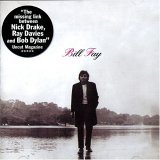 Eclectic Discs' superlative reissues of Bill Fay's pair of classic1970s LPs are well-timed, appearing at the crest a few years of slowlybuilding buzz around this most arcane of British singer-songwriters.
Eclectic Discs' superlative reissues of Bill Fay's pair of classic1970s LPs are well-timed, appearing at the crest a few years of slowlybuilding buzz around this most arcane of British singer-songwriters.
Eclectic Discs
The two albums were briefly available together on one CD from See ForMiles, but quickly went out of print when the label folded. Last year,Wooden Hill/Tenth Planet records issued From the Bottom of an Old Grandfather Clock,a disc of previously unheard demos and alternate mixes from Fay's earlysessions. Jim O'Rourke and Wilco paid homage to "Britain's popSalinger" by recording a version of "Be Not So Fearful," after whichDavid Late Tibet of Current 93 jumped into the fray, issuing thenever-before-released third album Tomorrow, Tomorrow and Tomorrow,recorded in the late 70s by the Bill Fay Group, on Durtro/JnanaRecords, and covering Fay's apocalyptic miniature symphony "Time of theLast Persecution" at subsequent shows and on a limited 7". And throughall of this renewed interest in the artist, the two legendary albumsthat started it all - Bill Fay (1970) and Time of the Last Persecution(1971) - could only be heard by those with enough cash to fork over forrare copies of the original Deram LPs or the extremely scarce See ForMiles CD. So Eclectic have done a solid for Bill Fay fans the worldover by releasing this nice pair of reissues, which contain remasteredversions of both LPs with original artwork and liner notes, as well asnew liner notes written by Fay himself. I've already raved about thesealbums a couple times before (here and here),so I'll try not to replicate those comments, and instead just offersome remarks about these reissues, and why I think Bill Fay stands outamong his other, more established peers.
When I first heard Bill Fay, I was struck by whatsounded like an unresolvable duality; two competing interests thatthreatened to pull me in two different directions. On the one hand wasFay's voice, a raspy, world-weary voice instrument that has beenrightly compared to Nick Drake, Ray Davies and Bob Dylan, singingexistential lyrics full of stoned introspection and spiritual yearning.On the other hand were the arrangements, big overblown saccharinestring swells with ludicrous saxophone solos and orchestral crescendosthat would make even the most MOR adult-contemporary artist blush.Paradoxically, this juxtaposition made Fay's intensely personal lyricsseem even more heartbreaking, as the singer sounded set adrift in aworld that he couldn't possibly comprehend. I'm a sucker for greatalbum openers, and Bill Fay opens with one of the best I've heard,"Garden Song," in which the artist attempts to integrate himself withnature, and sings of a desire to be cleansed and reborn. It's thisspiritual yearning that forms the overarching concept of Bill Fay'strilogy of albums, with the debut representing the first foot set onthe path to salvation, Persecution with its dark prognostications of apocalypse, and Tomorrowwith its glorious ascension into heaven. Though the first album isexcellent in its own right, it's very interesting when compared to itsmore mature and better-produced successor, which backed off on thesyrupy string arrangements, and added psychedelic fuzz guitar andmoments of cataclysmic free jazz into the mix. It could be argued thatBill Fay's first album was the result of a glorious miscalculation, aproducer who wasn't paying attention to the songwriting, and thuscreated Scott Walker-esque arrangements that were wholly inappropriate,but somehow magically work anyway. Eclectic Discs' reissue is nearlyperfect, with great sound and packaging, as well as the addition ofFay's sought after early 45rpm single "Some Good Advice/Screams in theEars," a fantastic double-dose of mannered British psych-pop that worksas a palate-cleanser after the weighty song cycle that precedes it.
samples:
And then there is Time of the Last Persecution, a conceptalbum inspired by a 19th-century ministerial commentary on the Book ofRevelations, and the most intense musical works of apocalyptic exegesisoutside the discography of Current 93. Its intensity is due not only tofrightening lyrics ("It is the time of the Anti-Christ...he will askfor his feet to be kissed by your sister"), but also the uniquearrangements featuring the guitar of Ray Russell and a small hornsection, which frequently rises to a chaotic din as a counterpoint toFay's world-weary prophesying. This album is often romanticallydescribed as the product of drug burnout, as the difference between theclean-shaven, happy "teddy boy" on the debut LP cover, and the shaggy,longhaired, bearded Bill Fay in the midst of spiritual or psychedelicmalaise on the Persecution sleeve is quite shocking indeed. Tracks like"Don't Let My Marigolds Die" and "Come A Day" do little to dissuadelisteners of the notion that this album was recorded deep in some sortof spiritual crisis. Eclectic's reissue includes new liner notes byBill Fay, describing the process of conceiving and recording the album,as well as the reasons for his total disappearance from recorded musicfor the next 35 years. Also included are the original liner notes,which trace Fay's modernist, T.S. Eliot-style take on ancient endtimesprophecy, in a long prose-poem that I found brilliant. It's really agood thing to have this album and its predecessor back in print, and Ihold out some faint hope that their reissue will perhaps occasion alive performance by Fay at some point in the near future. At least, Ihope he gets to it before the Rapture comes.
samples:Read More

